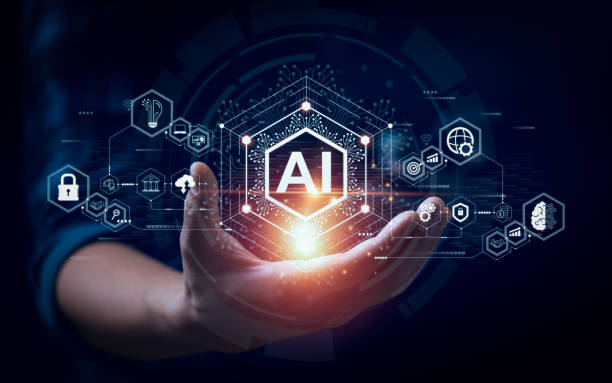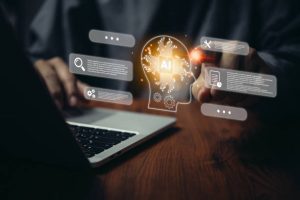(AI)Artificial Intelligence: Revolutionizing the Future Across Industries

(AI):
In the realm of technological advancements, few phenomena have captured the imagination and potential of humanity as much as Artificial Intelligence (AI). Often depicted in science fiction as sentient robots or super-intelligent beings, Artificial Intelligence has evolved far beyond its fictional portrayals, becoming an integral part of our lives and revolutionizing industries across the spectrum. From healthcare to finance, from entertainment to transportation, it has transformed the way we live, work, and interact.
In this article, we will delve into the various facets of Artificial Intelligence, its current state, its applications across industries, and the ethical considerations that come with its rapid development.
Understanding AI: From Concept to Reality
Artificial Intelligence, at its core, refers to the simulation of human intelligence processes by machines, particularly computer systems. The primary goal of Artificial Intelligence is to enable machines to perform tasks that typically require human intelligence, such as problem-solving, decision-making, speech recognition, language translation, and even creative thinking. Artificial Intelligence systems operate on algorithms that allow them to process vast amounts of data, recognize patterns, and make predictions based on the information available to them.
The journey of Artificial Intelligence from its conceptualization to its current state has been marked by significant milestones. The term “Artificial Intelligence” was first coined in the 1950s, sparking a wave of enthusiasm and research into creating machines that could mimic human cognitive abilities. Early Artificial Intelligence research focused on symbolic reasoning and logic, attempting to replicate human thought processes through code and rules.
However, progress was slow due to the limitations of hardware and the complexity of human intelligence. It wasn’t until the 21st century, with the advent of powerful computing hardware and the development of machine learning algorithms, that it truly began to flourish. Machine learning involves training algorithms on massive datasets to enable them to learn and improve from experience, leading to the birth of a subfield known as deep learning. Deep learning, characterized by neural networks, brought about breakthroughs in image recognition, natural language processing, and more.

Applications Across Industries
One of the most remarkable aspects of Artificial Intelligence is its versatility. It has infiltrated nearly every industry, bringing about transformative changes and enhancing various processes. Let’s explore how it is making its mark across sectors:
Healthcare: In healthcare, it is revolutionizing diagnostics, treatment planning, and patient care. Image recognition algorithms analyze medical images to identify diseases like cancer with unprecedented accuracy. Artificial Intelligence-powered chatbots assist patients with medical queries, and predictive analytics help hospitals manage patient flow efficiently.
Finance: It plays a crucial role in the financial sector through algorithmic trading, fraud detection, and risk assessment. Machine learning models analyze market trends to make investment decisions, while Artificial Intelligence-powered systems identify potentially fraudulent transactions by recognizing patterns in real-time data.
Entertainment: The entertainment industry leverages Artificial Intelligence for content recommendation, personalizing user experiences on platforms like Netflix and Spotify. Additionally, AI-generated content, such as music and art, is gaining traction, blurring the lines between human and machine creativity.
Transportation: Self-driving cars are a prime example of AI’s impact on transportation. These vehicles use sensors and Artificial Intelligence algorithms to navigate roads, make real-time decisions, and enhance road safety. Additionally, AI optimizes traffic flow by analyzing data from various sources to suggest alternative routes.
Manufacturing: It has transformed manufacturing processes. Robots equipped with AI can perform intricate tasks with precision and speed, leading to improved product quality and reduced production costs.

Ethical Considerations and Challenges
As AI’s influence continues to expand, it brings forth a host of ethical considerations and challenges that need to be addressed. One major concern is job displacement. As Artificial Intelligence and automation take over routine tasks, there is a fear of job loss, particularly in industries with repetitive tasks like manufacturing and customer service. However, proponents argue that Artificial Intelligence will create new job opportunities in fields like Artificial Intelligence development, data analysis, and machine maintenance.
Another critical aspect is bias in Artificial Intelligence algorithms. Since machine learning systems learn from historical data, they can perpetuate existing biases present in the data. This can lead to discriminatory outcomes in areas like hiring, lending, and law enforcement. Ensuring fairness and transparency in Artificial Intelligence algorithms is an ongoing challenge that requires collaboration between technologists, ethicists, and policymakers.
Privacy is also a pressing concern. With AI’s ability to process and analyze vast amounts of personal data, there are concerns about how this information is used and protected. Striking a balance between deriving insights from data and respecting individuals’ privacy rights is crucial.
The Road Ahead: Future Possibilities
The future of AI holds tremendous promise. Here are a few areas where Artificial Intelligence is expected to make significant contributions:
Healthcare Advancements: Artificial Intelligence-driven drug discovery, personalized medicine, and disease prediction have the potential to transform healthcare into a proactive and tailored system.
Climate Change Solutions: It can be used to analyze climate data, optimize energy consumption, and develop innovative solutions for mitigating the effects of climate change.
Human-Machine Collaboration: Collaborative robots (cobots) that work alongside humans, understanding and adapting to their needs, are likely to become more common in industries like manufacturing.
AI Ethics and Regulations: As artificial Intelligence continues to evolve, the need for robust ethical guidelines and regulations will become increasingly important to ensure the responsible development and deployment of AI systems.

Conclusion
Artificial Intelligence has transcended its science fiction roots to become a tangible force driving innovation across industries. Its impact on healthcare, finance, entertainment, transportation, and manufacturing is reshaping the way we live and work. As we navigate the ethical challenges and complexities that come with AI’s advancement, it is imperative to strike a balance between harnessing its potential and ensuring that its implementation is guided by ethical considerations. The journey of AI is far from over, and as it continues to evolve, its influence on society and the world will undoubtedly be profound.





